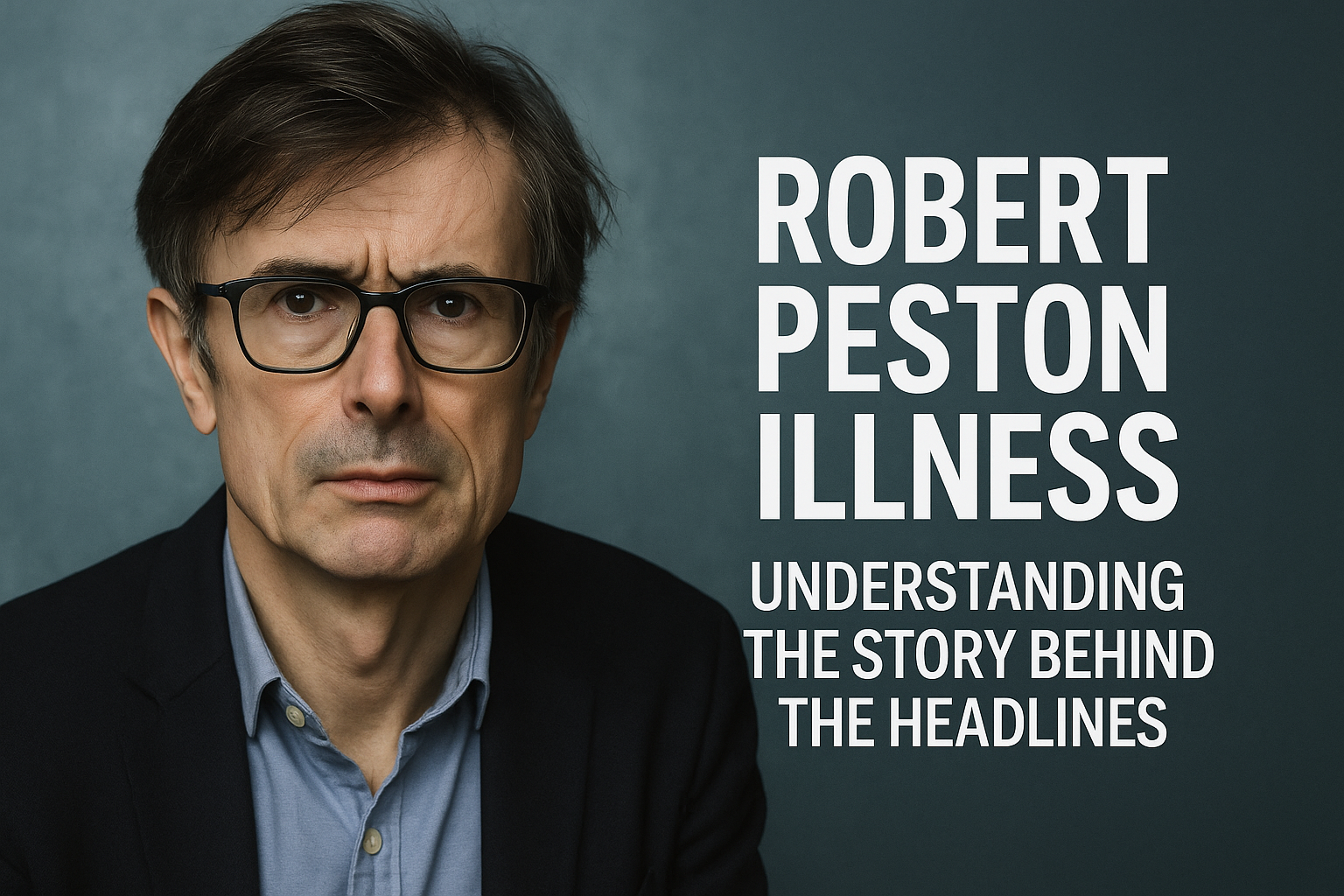Robert Peston is one of the most recognized journalists in the United Kingdom. Born in London in 1960, he has built a long career as a political and economic correspondent, first with the Financial Times, then with the BBC, and later with ITV News, where he currently works as Political Editor. He also hosts his own political program Peston, a weekly show that combines news analysis with in-depth interviews. His style, both in speaking and reporting, is unique, and his reputation as a journalist who can break big political and financial stories is well established.
Beyond his professional life, Robert Peston has also become a public figure because of discussions surrounding his personal life and health. Over the years, the phrase “Robert Peston illness” has been a frequent topic of online searches and conversations. This interest reflects both public curiosity and genuine concern, as audiences who follow him on television sometimes notice changes in his appearance, energy, or voice.
Why People Search for Robert Peston Illness
The main reason people search for information about Robert Peston illness is his distinctive speaking style and occasional appearance of being fatigued on screen. Peston’s voice is famously unusual, with its shifting pitch and rhythm. Some viewers have speculated that it might be linked to a medical condition, while others simply see it as his natural style of communication.
Additionally, Peston has been through significant personal struggles, which have raised questions about how these experiences may have affected his health. When public figures face bereavement, stress, or illness, their lives often become a topic of speculation. In Peston’s case, the combination of his unique presence on television and his openness about personal challenges has led to recurring discussions about his health.
The Distinctive Voice of Robert Peston
One of the strongest associations with Robert Peston illness is his voice. His intonation, which many describe as jerky or uneven, has been the subject of both criticism and parody. Some assumed it must be related to a throat condition or another form of illness. However, Peston has explained in interviews that his voice is simply the way he speaks, shaped by habit and perhaps influenced by stress or overwork.
While his speaking style may fuel rumors, it has also become a trademark. People instantly recognize his reports because of his delivery, and in the world of journalism, standing out is not necessarily a disadvantage. Still, the uniqueness of his voice has made it easy for people to connect it with assumptions about health.
Personal Loss and Its Effect on Health
When discussing Robert Peston illness, it is impossible to ignore the impact of his wife’s death. In 2012, his wife Siân Busby, a novelist and broadcaster, passed away from lung cancer. Peston has spoken openly about how this loss affected him. Grief is not always described as an illness, but it can have a powerful effect on both mental and physical well-being.
Peston has described the period following her death as one of the hardest in his life. The emotional strain affected his sleep, his energy, and his ability to concentrate. For many viewers who noticed changes in his appearance during this time, the assumption was that he must be physically ill. In reality, he was dealing with the immense emotional weight of bereavement.
His honesty about grief has been valuable in public discussions about mental health. By acknowledging how loss affected him, Peston helped open a space for others to talk about similar experiences. This willingness to speak about emotional pain is one reason why discussions of Robert Peston illness often blend physical and psychological health.
The Stress of a High-Pressure Career
Journalism, especially political and economic reporting, is a profession that places extraordinary demands on its practitioners. Journalists like Robert Peston are expected to work long hours, meet tight deadlines, and stay sharp during constantly changing news cycles. The stress of this kind of work can contribute to fatigue, exhaustion, and sometimes health problems.
Peston has acknowledged that the intensity of his career affects his health. Covering major political events, especially during crises such as Brexit or general elections, means constant pressure. The stress does not always manifest in obvious illness, but it can cause the appearance of weariness, which audiences then interpret as a sign of medical problems.
Clarifying the Rumors About Robert Peston Illness
Despite all the speculation, Robert Peston has not revealed any serious, life-threatening illness. Much of the public discussion is based on assumptions made by viewers rather than official information. His slim build, expressive speaking style, and occasional tired look have fueled rumors, but Peston himself has dismissed suggestions of having cancer or another major condition.
Instead, what is clear is that Peston has faced the emotional challenge of bereavement, the physical effects of a demanding career, and the normal ups and downs of health that come with age. These factors, combined with public curiosity, have kept the phrase “Robert Peston illness” alive in media conversations.
Public Figures and Privacy
Robert Peston’s case raises a broader issue about how much of a public figure’s health should be open to discussion. On one hand, audiences who watch him regularly feel connected and naturally worry about his well-being. On the other, constant speculation about illness can feel invasive. Peston has struck a balance by acknowledging his struggles with grief and stress while keeping more personal medical details private.
This balance is important, as it reminds us that journalists, no matter how familiar they seem on screen, are still entitled to privacy. Their health should not become a subject of rumor unless they choose to speak about it.
Robert Peston’s Ongoing Work and Resilience
Despite challenges, Robert Peston continues to thrive in his career. His ITV program, Peston, remains a central platform for political debate in the UK, and his role as Political Editor keeps him at the forefront of major news events. His ability to remain active in such a demanding profession is itself a sign of resilience.
Far from being sidelined by illness, Peston is still one of the most visible figures in British media. His determination to continue reporting, despite personal difficulties, speaks to his strength and commitment.
Lessons From the Story of Robert Peston Illness
The ongoing public interest in Robert Peston illness offers lessons about how we view health in the lives of public figures. It highlights the importance of compassion when making assumptions. Often, what looks like illness may instead be the visible signs of stress, grief, or simply individuality.
Peston’s willingness to talk about his personal loss also underscores the value of honesty in public life. By acknowledging emotional challenges, he has helped reduce stigma around grief and mental health. In this sense, the story of Robert Peston illness is not only about speculation but also about resilience and openness.
Read also: Bernie Bourke: A Life of Integrity, Leadership, and Community Spirit
Conclusion
Robert Peston remains one of the UK’s most respected journalists, despite years of public speculation about his health. The subject of Robert Peston illness reflects both curiosity and care from audiences who see him regularly on screen. While he has not disclosed any serious medical condition, his journey has involved coping with grief, managing stress, and maintaining resilience in the face of challenges.
Today, Peston continues to play a central role in British journalism, proving that speculation about illness does not define him. Instead, his career, his openness about personal struggles, and his ongoing contributions to public debate define the legacy he is building. The story of Robert Peston illness is ultimately a reminder that behind every public figure is a human being, navigating life with its difficulties and strengths.


